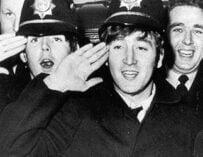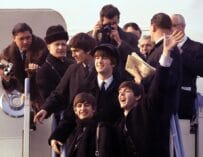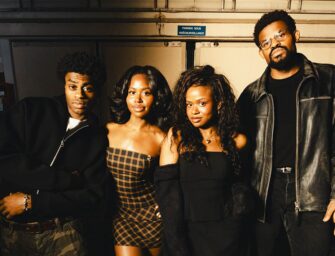Click here to read part one of this interview, in which Erickson talked to Songwriting about the Lennon/McCartney dynamic and analysing Beatles songs to find clues about where it all went wrong for the band…
We’d love to talk about some specific songs. Can you think of an example from their early music which set them apart from the very start?
“She Loves You because it’s a true Lennon and McCartney collaboration; they wrote it together, sing it together, and it’s a shot of pure joy and energy. And it sounds like no one else. It only sounds like the Beatles. All of them. One of the interesting features of The Beatles is that it’s not one lead person. It’s Lennon and McCartney and Harrison. It’s hard to get bored with three voices and three songwriters. And, of course, with the genius of Ringo.
“She Loves You is also very Beatlesesque in that it incorporates the idea of friendship. It’s, ‘She Loves You,’ not ‘I Love You.’ There are multiple people in the song. A guy, a girl, and a buddy or two or three. They’re all in the song. They’re excited. We’re excited. It’s a joy.”
How about a song that was written at the peak of the Lennon and McCartney partnership?
“A Day In The Life. That song is a true 50/50 collaboration between Lennon and McCartney. Lennon said Sgt. Pepper was a peak for Lennon and McCartney’s partnership, and A Day In The Life is the peak of the peak. And I see it as true Lennon/McCartney creation. Sometimes it’s seen as a John song, but that undervalues everything McCartney brought to it.
“John came in with that first verse with its beautiful chords, exquisite sound, and the original idea of talking about everyday life. Then, they wrote the rest of the lyrics together. But this song is almost like a collage; it was a new way of collaborating. They inserted one of Paul’s songs into the middle of it, but they also incorporated many of his other musical ideas.”
In what way do you think that then elevated the song?
“Well, first, Paul’s section changes the song entirely because it puts the listener into the song. After this dreamy section from John, all of a sudden, we, the listener, are in the song, experiencing it with the narrator.
“And then Paul added the line, ‘I’d love to turn you on,’ which is what the Beatles wanted to do. They wanted to turn the world on to everything they discovered. It was their invitation to us. They were so inclusive. But also flirtatious.”
It feels like it’s one of the most important lines in their entire catalogue…
“Yes, it does. John noted that Paul brought that little phrase to the song, and it was beautiful because they loved to turn each other on musically. It was part of their dynamic; they always tried to turn each other on creatively. Even after the breakup, I think they were still collaborating, but differently, bouncing off each other, trying to provoke a reaction from the other. So yes, ‘I’d love to turn you on,’ basically sums up their creative dynamic.
“Also, Hunter Davies observed that working with McCartney seemed to make Lennon more alive, and I can almost hear this in the song. John’s section builds momentum as the song progresses and is full of energy by the end.”
Can you highlight any other specific elements?
“The song includes everything Paul had learned from his exploration of the counterculture and avant-garde scenes, including the orchestral swell. There’s a great debate about who’s singing the ‘Aahhs,’ it could be one or the other, or it could be both. But you can’t tell because they mirror each other so well.
“There’s also a personal element to it. Apparently, John brought a newspaper to their collaborating session [as mentioned in the lyrics], and the headline was about Tara Browne. Tara Browne had been a friend of Paul’s. He brought Tara and his wife to Liverpool over the Christmas holidays in 1965 and dropped acid for the first time with Tara Browne. I suspect Paul’s new crew of friends, including Tara, might have been an issue for John. And John wasn’t particularly friendly with Tara Browne, so I wonder about John putting him in the song.”

The Beatles in 1965. Photo: Wikimedia Commons/Public Domain
Surely there’s no way Lennon would have chosen to write about Tara Browne without knowing the significance? One of the things your podcast highlights so well is how McCartney could be quite insensitive to Lennon’s feelings, almost like the breakup was a result of death by a thousand cuts…
“Precisely. It seems like John was trying to communicate something. Whether McCartney heard it is another issue. John was so sensitive, and that’s exactly right… McCartney was perhaps not sensitive enough to Lennon’s feelings or what he was trying to communicate, and perhaps Lennon could never articulate what he wanted or needed. And of course, he also believed they had this telepathy, which surely created confusion. McCartney complains about this in Get Back. There were assumptions on both sides. McCartney’s insensitivity was something that Lennon commented on in the ‘70s. But of course, McCartney could only hurt Lennon because Lennon cared so much.
“The importance of McCartney to Lennon is underestimated, which needs to be corrected. McCartney was as important to Lennon as Lennon was to McCartney. Lennon could be, by all accounts, extremely loving and wonderful, but he could also be possessive and jealous, and I suspect one of the people he was most possessive of was McCartney. And, of course, McCartney was possessive of Lennon. Ringo once said all of the Beatles were very possessive of each other.”
If a Martian landed on Earth and wanted you to introduce them to the brilliance of The Beatles via one song, which would you choose?
“I would say A Day In The Life. I don’t know if it’s the most representative song, but it’s a masterpiece. You could say Hey, Jude, but that is more Paul’s dominant, or Strawberry Fields Forever, but that’s more John dominant. So I think A Day In The Life is a good choice.
One last example… Is there a song where you question the traditional narrative and see in a different way to how it tends to be written about?
“A solo song. Listeners to my podcast will know that I often point to the song Jealous Guy. Paul commented on it in an interview in the mid-80s; he said that John told him it was about him. Surprisingly, this information has gone relatively unnoticed, because if you take Paul at his word and look at the lyrics of Jealous Guy, I believe it tells the story of the breakup.
“So I would encourage people to look at it through this lens — that it was written about Paul in 1971, at the height of their arguments and upset with each other. And even if it’s not about McCartney, it tells us a lot about how Lennon operates, he provokes when he gets scared or believes people don’t love him. It’s not only a spectacularly beautiful song, it’s an important one to the story.”
Lastly, what can we look forward to next and in future on One Sweet Dream?
“So much. I am working on The Cleave Series, a deep dive into Maureen Cleave’s superb profiles on the Beatles from 1966. This was the first part of my deep dive into the 1966/1967 period, which I will continue next season. It’s such a fascinating period.
“Also, I will continue with a series called Aftermath, which digs into the two years following Lennon’s ‘Divorce’ announcement in September 1969. I released one episode this year. Next year, we’ll do the rest. I am also fascinated by Wings’ early years, which haven’t been adequately examined. And actually, I am considering digging into the women of the Beatles as well.
“I will also continue with the Hidden Gems series [where informed guests advocate for some of their favourite Beatles songs] because I always aim to present the story through a new lens, and I love hearing people champion their favourite songs. It helps me see them in a new way, often making me love them too. Plus, it’s a lovely way to have some wonderful guests on the podcast. And then, of course, I have some other tricks up my sleeve, so it should be exciting.”



































Related Articles